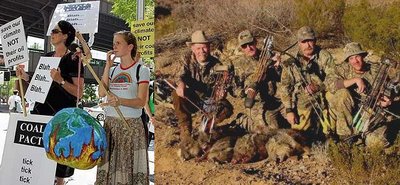 Christina Larson of Washington Monthly has an engaging piece on the growing political alliance between hunters and environmentalists, and how that alliance may affect the sport of hunting (Larson, "The Emerging Environmental Majority," Wash. Monthly, May 2006). Traditionally, these two groups have gravitated towards very different political channels. Hunters have usually been associated with the Republican Party, which tends to favorably advance the interests of the National Rifle Association, while environmentalists have often leaned on the Democratic Party for a more welcoming audience.
Christina Larson of Washington Monthly has an engaging piece on the growing political alliance between hunters and environmentalists, and how that alliance may affect the sport of hunting (Larson, "The Emerging Environmental Majority," Wash. Monthly, May 2006). Traditionally, these two groups have gravitated towards very different political channels. Hunters have usually been associated with the Republican Party, which tends to favorably advance the interests of the National Rifle Association, while environmentalists have often leaned on the Democratic Party for a more welcoming audience.
And on the surface, hunters and environmentalists would seem to embrace very different philosophies about Earth management. Hunters like to kill animals; environmentalists like to save them. But as Larson writes, both groups lose out when mining, oil, and gas companies gain access to public lands and begin extracting resources. Environmentalists get upset because the animals die; hunters get upset because they didn't get to kill them.
Larson reports that these two groups have now found a common enemy:
Over the past five years, Bush administration policies in the west—accelerating drilling on public lands and waiving protections on water quality and wildlife—have given this odd couple a common enemy. "The White House's pillaging of public lands has driven hunters and ranchers into the trenches with environmentalists," says David Alberswerth of the Wilderness Society. "There's absolutely no question about what's brought us closer together," agrees Oregon hunter and prominent outdoor columnist Pat Wray. "It's the Bush administration."
 on dioxide that contribute to global warming and threaten fish and wildlife habitat." Larson's terrific article offers other anecdotes suggesting that the sport of hunting should no longer be viewed as a "Republican sport."
on dioxide that contribute to global warming and threaten fish and wildlife habitat." Larson's terrific article offers other anecdotes suggesting that the sport of hunting should no longer be viewed as a "Republican sport."And a union of hunters and environmentalists would seem to offer an incredibly powerful lobbying group, and one, interestingly enough, that would represent the more harmonized environmental/hunting views of President Theodore Roosevelt from almost a century ago. On that note, consider that the polar-opposites characterization I posited above concerning hunters and environmentalists is misleading: a hunter is an environmentalist, because he relies on a continued existence of animals found in the wild.
But even with this burgeoning relationship and understanding, will hunting continue as a viable sport? In January, we discussed another article by Larson, and it explored the contraction of available hunting land and how the percentage of American hunters has dropped steadily in recent years. Hunters have traditionally relied on Republicans to protect their gun rights, but are those same Republicans now rendering their guns useless? And will hunters--who obviously can't match the massive GOP fundraising contributions of big corporations who want their land--be able to fend off a shrinking terrain?





0 comments:
Post a Comment